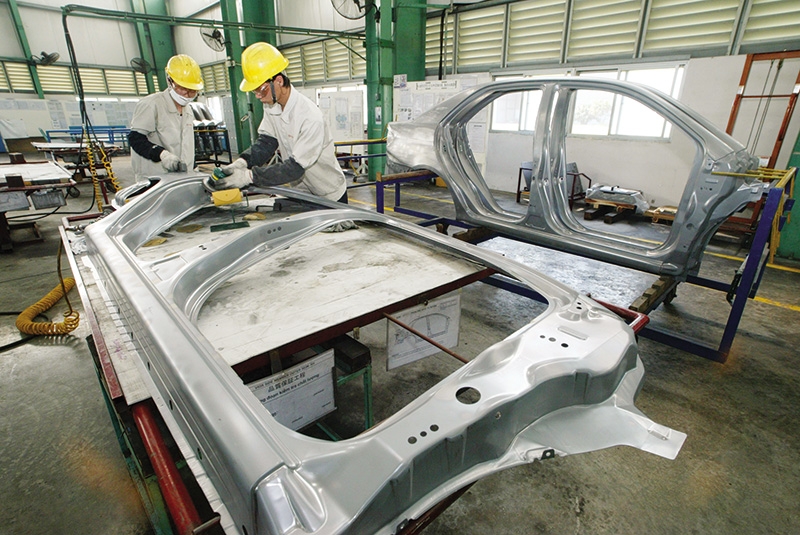Supporting industry strategies voiced
 |
| The development of the supporting industries across the country will lead to aiding competitiveness,Photo: Le Toan |
Established in 2005, Professional Graphic Packaging JSC in the northern city of Haiphong has been receiving technical support from the Japan International Cooperation Agency (JICA) in Vietnam in applying the 5S system since last October.
The method stands for the five Japanese words of “Seiri, Seiton, Seiso, Seiketsu, and Shitsuke”, which respectively mean “Sort, Set in order, Shine, Standardise, and Sustain”. The 5S system aims to help companies identify factors that impede their productivity and develop solutions to common industry problems.
With the JICA support, Professional Graphic Packaging has been able to become partners of some Japanese firms in Vietnam.
The agency has supported 19 enterprises and now is also supporting another 10 in Haiphong, along with many more in other provinces and cities.
“We are willing to extend our 5S programme all over Vietnam, so that enterprises here can improve their productivity to catch the opportunities of Industry 4.0, and so the economy can improve its growth quality,” Kobayashi Ryutaro, senior representative of JICA Vietnam, told VIR. “They can also provide products to Japanese firms in Vietnam which are suffering from a lack of high-quality suppliers due to the country’s weak supporting industries.”
At the recent mid-term Vietnam Business Forum in Hanoi, Japanese Chamber of Commerce and Industry in Vietnam (JCCI) chairman Nobufumi Miura told the Vietnamese government that thousands of Japanese enterprises currently wish to invest in Vietnam, where they see great potential in industrial development as compared to many regional nations.
However, many of them remain reluctant in cultivating their projects in Vietnam as they are facing some hurdles, including weak supporting industries caused by snags in tax and incentives. If the hurdles are solved, Vietnam can become one of the biggest attracters of Japanese investment in the region, according to Miura.
“In order to develop enterprises whose products meet the global standard quality, we expect the government to discuss the policies on the incentive programme for manufacturing of high quality products,” Miura said. “Implementation of 5S or ISO is also highly recommended for the management foundation for the future.”
He also highlighted some tax-related hurdles making it difficult for Japanese firms to develop supporting industries in Vietnam.
For example, in May 2018 the government issued Decree No.82/2018/ND-CP on management of industrial parks (IPs) and economic zones, but the decree eliminated the 50 per cent reduction of personal income tax (PIT) in special economic zones (SEZs), taking effect last July. This incentive had been valid since 2008 in Decree No.29/2008/ND-CP on IPs, export processing zones, and EZs.
“The sudden withdrawal of tax incentives made a huge negative impact on the profitability and financial planning of companies located in the SEZs, causing critical confusion among the companies, and the predictability of the laws has not been secured,” Miura said. “Appropriate length of transitional periods should have been established, and a relief programme needs to be provided for the enterprises which can be negatively affected by changes in laws and regulations.”
In fact, irked by the sudden withdrawal of the PIT incentive, many Japanese firms have complained to the departments of taxation in some provinces home to their projects, such as Tay Ninh, Kien Giang, Quang Ngai, and Quang Nam, as well as the General Department of Taxation.
Besides, the JCCI also highlighted a need for application of supporting industrial tax incentives to business expansion before 2015
According to Decree No.111/2015/ND-CP on supporting industries development released in November 2015 and Circular No.55/2015/TT-BTC promulgated the following month on corporate tax law and industrial tax incentives, if business expansion before 2015 met the conditions of current regulations, it is reasonable for the enterprises to enjoy the corporate tax incentives for the supporting industries, as Ministry of Justice and the Ministry of Industry and Trade agreed. It is also understood that Article 13(1) of the Law on Investment can support the interpretation.
“However, there have been cases where the Ministry of Finance refused to apply tax incentives,” Miura added. “The interpretation by Vietnamese authorities should be consistent so that enterprises can expect the correct application of the law. The predictability of the laws should be secured.”
“This situation disturbs the investment in supporting industries. The Vietnamese government is supposed to urgently expresses its consistent opinion and should provide clear and detailed evidence and ensure predictability of the laws so that enterprises can rely on the laws.”
As of June 20, 2019, Japan had over 4,200 valid investment projects in Vietnam, registered at $57.5 billion, the Vietnamese Ministry of Planning and Investment reported.
What the stars mean:
★ Poor ★ ★ Promising ★★★ Good ★★★★ Very good ★★★★★ Exceptional
 Tag:
Tag:
Related Contents
Latest News
More News
- Kurz Vietnam expands Gia Lai factory (February 27, 2026 | 16:37)
- SK Innovation-led consortium wins $2.3 billion LNG project in Nghe An (February 25, 2026 | 07:56)
- THACO opens $70 million manufacturing complex in Danang (February 25, 2026 | 07:54)
- Phu Quoc International Airport expansion approved to meet rising demand (February 24, 2026 | 10:00)
- Bac Giang International Logistics Centre faces land clearance barrier (February 24, 2026 | 08:00)
- Bright prospects abound in European investment (February 19, 2026 | 20:27)
- Internal strengths attest to commitment to progress (February 19, 2026 | 20:13)
- Vietnam, New Zealand seek level-up in ties (February 19, 2026 | 18:06)
- Untapped potential in relations with Indonesia (February 19, 2026 | 17:56)
- German strengths match Vietnamese aspirations (February 19, 2026 | 17:40)






















 Mobile Version
Mobile Version